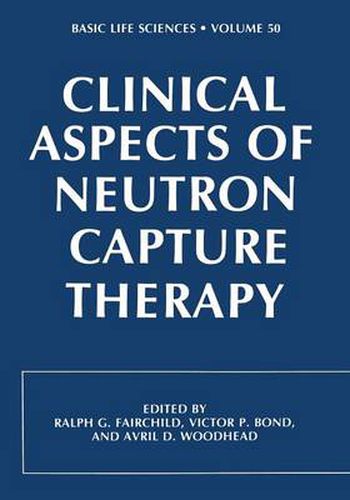Readings Newsletter
Become a Readings Member to make your shopping experience even easier.
Sign in or sign up for free!
You’re not far away from qualifying for FREE standard shipping within Australia
You’ve qualified for FREE standard shipping within Australia
The cart is loading…






This title is printed to order. This book may have been self-published. If so, we cannot guarantee the quality of the content. In the main most books will have gone through the editing process however some may not. We therefore suggest that you be aware of this before ordering this book. If in doubt check either the author or publisher’s details as we are unable to accept any returns unless they are faulty. Please contact us if you have any questions.
Since Locher first suggested Boron Neutron Capture Therapy (BNCT) in 1936, this theoretically ideal system has intrigued investigators. Unfortunately, the first clinical trials between 1951-1961 were not successful. However, they served to implant firmly the seed of BNCT, the growth of which has been carefully nurtured at a number of locations world-wide. This fact is attested to by the ongoing clinical trials in Japan as well as by the presence of researchers from active groups in the ten countries represented at this Workshop. In 1983 and 1985, the first and second international biannual symposia on BNCT were held, in response to a resurgence of interest in this field. In 1986, the DOE sponsored a workshop on NCT, in large part directed toward evaluating the national effort and the various neutron sources available within the United States. It now seems likely, because of various factors including improved neutron beams and boron delivery systems which have made the modality more attractive, that clinical trials will be initiated in the United States within the next few years. This 1988 special workshop, interspersed between the biannual international symposia, represents an effort to seek ideas and advice on the clinical a~pects of BNCT, from all those diverse groups with a national commitment to this project. Our purpose is to facilitate our endeavor to incorporate the best procedures and techniques in the upcoming clinical trials.
$9.00 standard shipping within Australia
FREE standard shipping within Australia for orders over $100.00
Express & International shipping calculated at checkout
This title is printed to order. This book may have been self-published. If so, we cannot guarantee the quality of the content. In the main most books will have gone through the editing process however some may not. We therefore suggest that you be aware of this before ordering this book. If in doubt check either the author or publisher’s details as we are unable to accept any returns unless they are faulty. Please contact us if you have any questions.
Since Locher first suggested Boron Neutron Capture Therapy (BNCT) in 1936, this theoretically ideal system has intrigued investigators. Unfortunately, the first clinical trials between 1951-1961 were not successful. However, they served to implant firmly the seed of BNCT, the growth of which has been carefully nurtured at a number of locations world-wide. This fact is attested to by the ongoing clinical trials in Japan as well as by the presence of researchers from active groups in the ten countries represented at this Workshop. In 1983 and 1985, the first and second international biannual symposia on BNCT were held, in response to a resurgence of interest in this field. In 1986, the DOE sponsored a workshop on NCT, in large part directed toward evaluating the national effort and the various neutron sources available within the United States. It now seems likely, because of various factors including improved neutron beams and boron delivery systems which have made the modality more attractive, that clinical trials will be initiated in the United States within the next few years. This 1988 special workshop, interspersed between the biannual international symposia, represents an effort to seek ideas and advice on the clinical a~pects of BNCT, from all those diverse groups with a national commitment to this project. Our purpose is to facilitate our endeavor to incorporate the best procedures and techniques in the upcoming clinical trials.